2025年高考英语语法专题 课件 形容词和副词
文档属性
| 名称 | 2025年高考英语语法专题 课件 形容词和副词 |

|
|
| 格式 | pptx | ||
| 文件大小 | 250.5KB | ||
| 资源类型 | 试卷 | ||
| 版本资源 | 通用版 | ||
| 科目 | 英语 | ||
| 更新时间 | 2024-12-05 09:03:53 | ||
图片预览

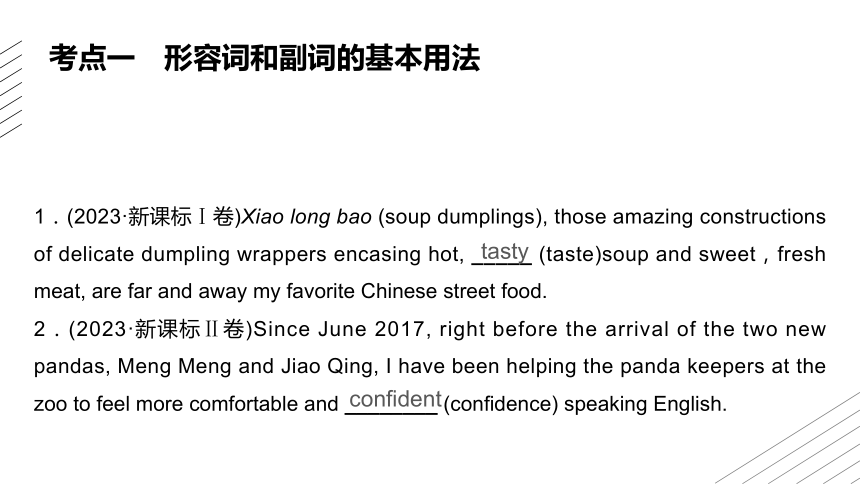
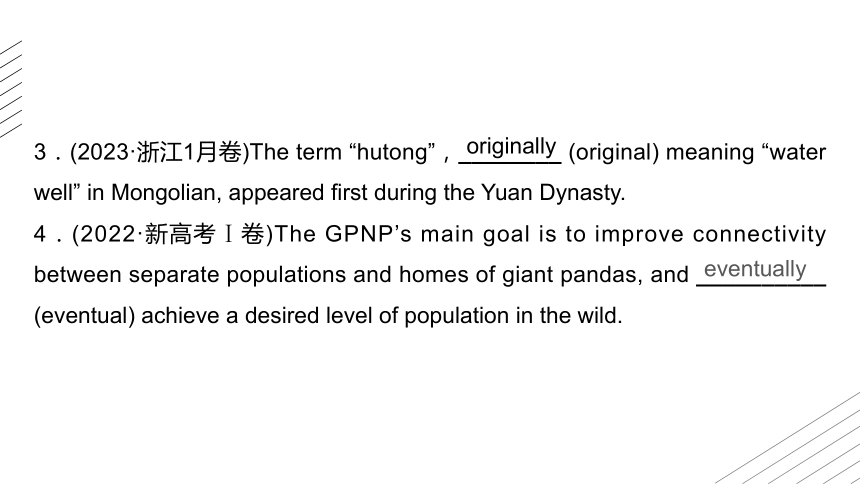
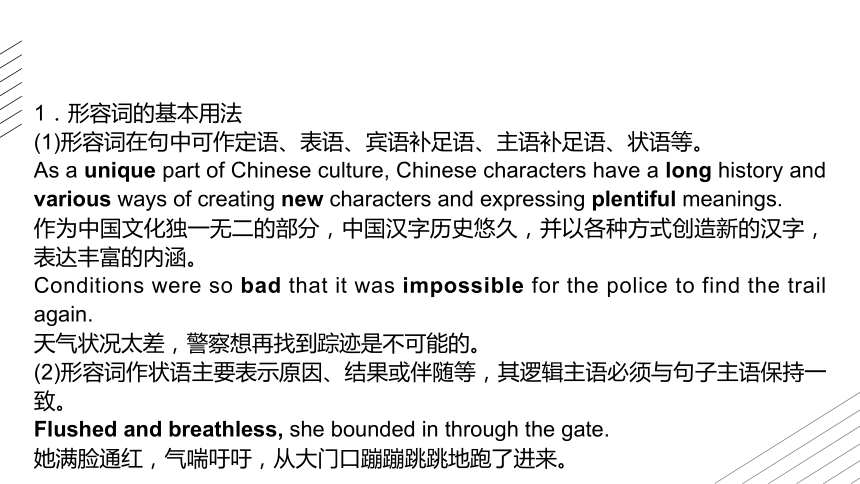
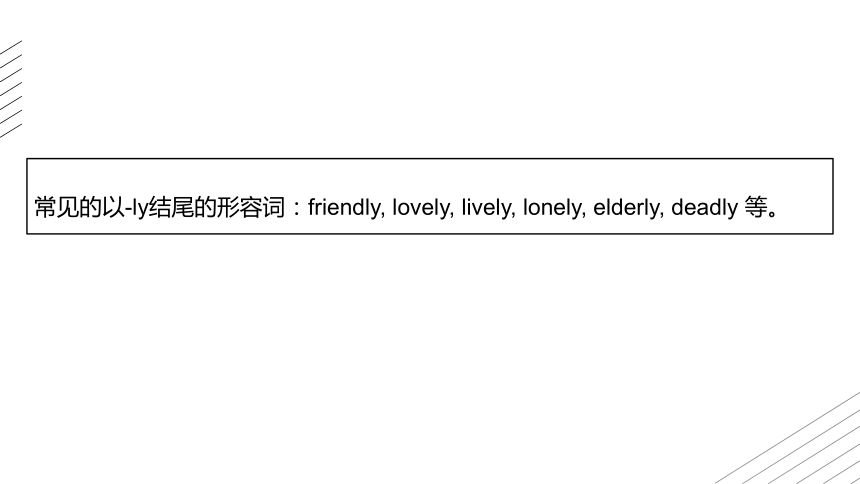
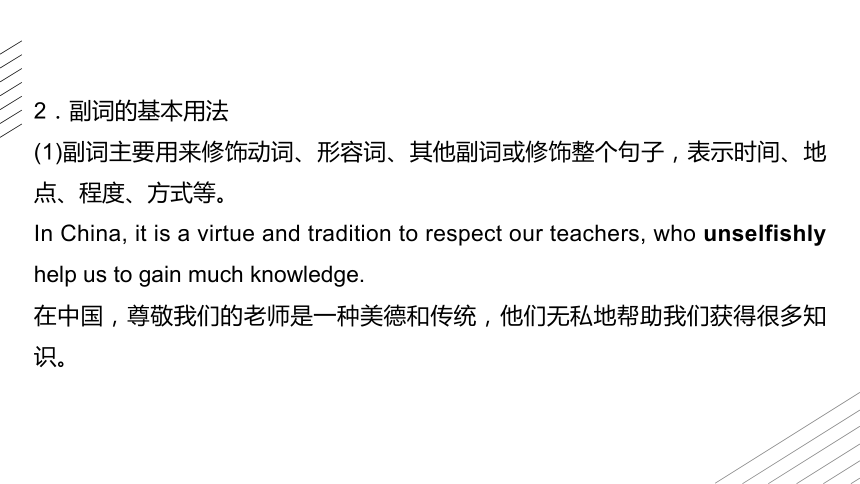
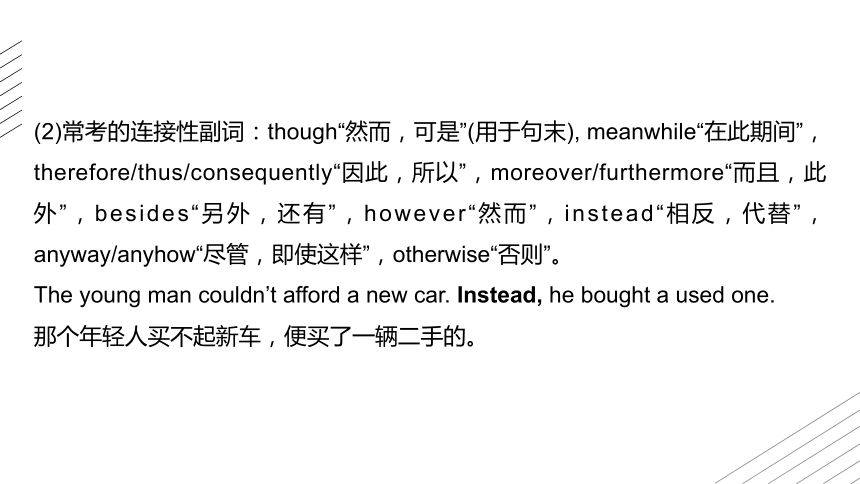
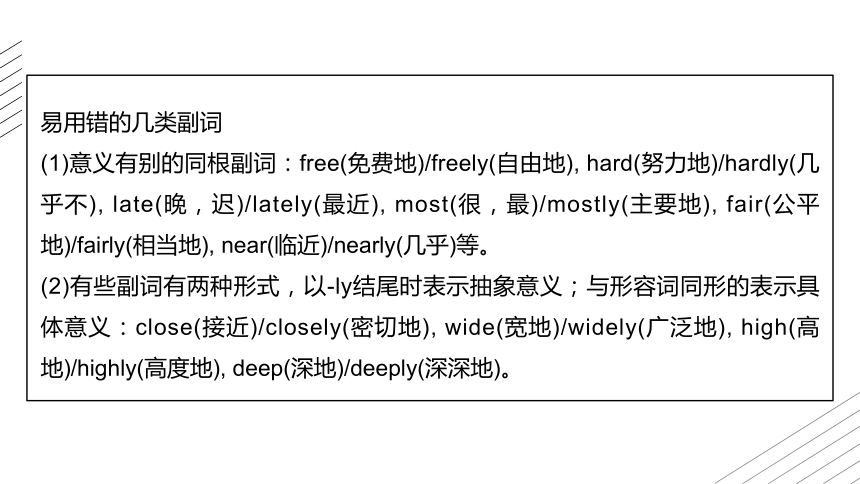
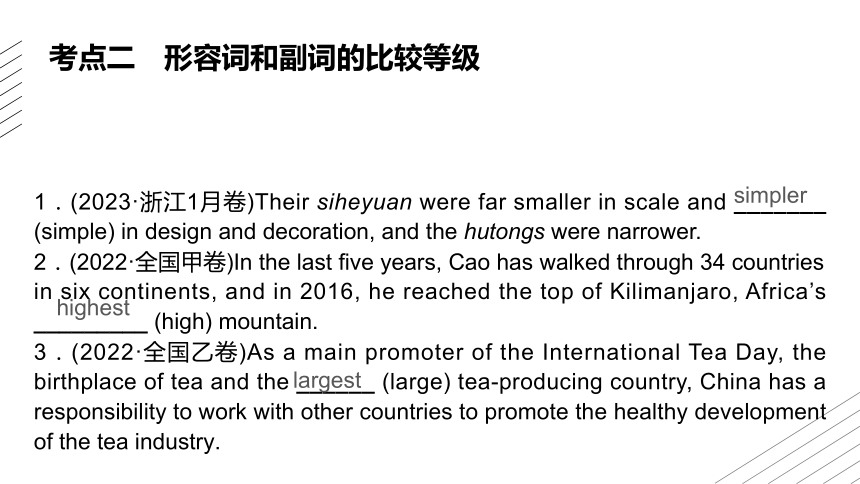
文档简介
(共23张PPT)
板块三 名词、形容词和副词
形容词和副词
2025年高考英语专题复习
1.(2023·新课标Ⅰ卷)Xiao long bao (soup dumplings), those amazing constructions of delicate dumpling wrappers encasing hot, _____ (taste)soup and sweet,fresh meat, are far and away my favorite Chinese street food.
2.(2023·新课标Ⅱ卷)Since June 2017, right before the arrival of the two new pandas, Meng Meng and Jiao Qing, I have been helping the panda keepers at the zoo to feel more comfortable and ________ (confidence) speaking English.
tasty
confident
考点一 形容词和副词的基本用法
3.(2023·浙江1月卷)The term “hutong”,________ (original) meaning “water well” in Mongolian, appeared first during the Yuan Dynasty.
4.(2022·新高考Ⅰ卷)The GPNP’s main goal is to improve connectivity between separate populations and homes of giant pandas, and __________ (eventual) achieve a desired level of population in the wild.
originally
eventually
1.形容词的基本用法
(1)形容词在句中可作定语、表语、宾语补足语、主语补足语、状语等。
As a unique part of Chinese culture, Chinese characters have a long history and various ways of creating new characters and expressing plentiful meanings.
作为中国文化独一无二的部分,中国汉字历史悠久,并以各种方式创造新的汉字,表达丰富的内涵。
Conditions were so bad that it was impossible for the police to find the trail again.
天气状况太差,警察想再找到踪迹是不可能的。
(2)形容词作状语主要表示原因、结果或伴随等,其逻辑主语必须与句子主语保持一致。
Flushed and breathless, she bounded in through the gate.
她满脸通红,气喘吁吁,从大门口蹦蹦跳跳地跑了进来。
常见的以-ly结尾的形容词:friendly, lovely, lively, lonely, elderly, deadly 等。
2.副词的基本用法
(1)副词主要用来修饰动词、形容词、其他副词或修饰整个句子,表示时间、地点、程度、方式等。
In China, it is a virtue and tradition to respect our teachers, who unselfishly help us to gain much knowledge.
在中国,尊敬我们的老师是一种美德和传统,他们无私地帮助我们获得很多知识。
(2)常考的连接性副词:though“然而,可是”(用于句末), meanwhile“在此期间”,therefore/thus/consequently“因此,所以”,moreover/furthermore“而且,此外”,besides“另外,还有”,however“然而”,instead“相反,代替”,anyway/anyhow“尽管,即使这样”,otherwise“否则”。
The young man couldn’t afford a new car. Instead, he bought a used one.
那个年轻人买不起新车,便买了一辆二手的。
易用错的几类副词
(1)意义有别的同根副词:free(免费地)/freely(自由地), hard(努力地)/hardly(几乎不), late(晚,迟)/lately(最近), most(很,最)/mostly(主要地), fair(公平地)/fairly(相当地), near(临近)/nearly(几乎)等。
(2)有些副词有两种形式,以-ly结尾时表示抽象意义;与形容词同形的表示具体意义:close(接近)/closely(密切地), wide(宽地)/widely(广泛地), high(高地)/highly(高度地), deep(深地)/deeply(深深地)。
1.(2023·浙江1月卷)Their siheyuan were far smaller in scale and _______ (simple) in design and decoration, and the hutongs were narrower.
2.(2022·全国甲卷)In the last five years, Cao has walked through 34 countries in six continents, and in 2016, he reached the top of Kilimanjaro, Africa’s _________ (high) mountain.
3.(2022·全国乙卷)As a main promoter of the International Tea Day, the birthplace of tea and the ______ (large) tea-producing country, China has a responsibility to work with other countries to promote the healthy development of the tea industry.
simpler
highest
largest
考点二 形容词和副词的比较等级
4.(2021·新高考Ⅰ卷)The amazing thing about the spring is that the colder the temperature gets, the ______ (hot) the spring!
5.(2021·浙江6月卷)When the house was built, it was much ______ (small) than it is today.
6.(2021·浙江1月卷)This may be due to some disadvantages for people living in the countryside, including _______ (low) levels of income and education, higher costs of healthy foods, and fewer sports facilities.
hotter
smaller
lower
1.比较级和最高级的构成
(1)规则变化
变化规则 例词
单音节的词一般在后面加-er和-est tall→taller→tallest
quick→quicker→quickest
以“辅音字母+e”结尾的词,在后面加-r和-st late→later→latest
pale→paler→palest
以“辅音字母+y”结尾的词,将y改为i,再加-er和-est early→earlier→earliest
heavy→heavier→heaviest
变化规则 例词
以一个辅音字母结尾的重读闭音节词,要双写这个辅音字母,再加-er和-est fat→fatter→fattest
big→bigger→biggest
thin→thinner→thinnest
hot→hotter→hottest
slim→slimmer→slimmest
flat→flatter→flattest
其他双音节和多音节的词在前面加more和most careful→more careful→most careful
有少数几个双音节以及-ow, -er, -le结尾的词,既可以加-er和-est,又可以加more和most构成比较级和最高级。这类词有common, clever, simple, quiet, stupid等。
原级 比较级 最高级
good/well better best
bad/badly/ill worse worst
many/much more most
far farther/further farthest/furthest
little less least
old older/elder oldest/eldest
(2)不规则变化
2. 比较等级的用法
(1)同级比较
①as+adj./adv. (原形)+as... “和……一样……”;not as/so+adj./adv. (原形)+as... “和……不一样……”
Since people are fond of humour, it is as welcome in conversation as anywhere else.
因为人们喜欢幽默,所以在谈话中或其他任何地方它都是受欢迎的。
②当as... as结构中有名词时,可用以下结构:
as+形容词原级+a(n)+n.+as...
as+many+可数名词复数+as...
as+much+不可数名词+as...
I’m not a little tired today after giving the room a thorough cleaning and I have never had as tiring a day as today.
今天对房间进行了大扫除之后我很累,我从来没有过比今天更累的一天了。
(2)比较级
“形容词/副词比较级+than”表示“两者中一方比另一方更……”。“less+形容词/副词原级+than”结构,表示“一方不及另一方……”。
I know my elder sister better than anyone else.
我比其他任何人更了解我姐姐。
修饰比较等级的副词:much, even, still, far, yet, a little, a lot, a bit, rather, any等。more, very等副词不可修饰比较级。
(3)最高级
①表示三者或三者以上的比较,常见的结构:“the+最高级+表示比较范围的短语或从句”,表示“……是……中最……的”。
The voyage was led by Zheng He, the most important Chinese adventurer of all time and one of the greatest sailors the world has ever known.
郑和统率了这次远航,他是中国历史上最重要的探险家,也是举世闻名的最伟大的航海家之一。
②最高级的其他表达法:
否定词+比较级
比较级+than+any other+单数名词
比较级+than+all the other+复数名词
比较级+than+any of the other+复数名词
比较级+than anything/anyone else
Your story is perfect. I’ve never heard a better one before.
你的故事太完美了。我以前从来没有听过比这更好听的故事。
The Yangtze River is longer than any other river/than all the other rivers/than any of the other rivers in China.
长江比中国的其他任何一条河都长。
有些词本身就有最高级含义,不能再用最高级形式,常见的有:favourite, wonderful, exhausted等;有些词本身有比较级含义,故不与than连用,如senior等。
(4)含有比较等级的特殊句型
①the+adj./adv. 比较级,the+adj./adv. 比较级“越……,越……”
② adj./adv. 比较级+and+adj./adv. 比较级 “越来越……”
③the+adj. 比较级+of the two+名词复数“某人或某物是两者中较……的那个”
④no more than “仅仅”,not more than “至多;不超过”
⑤more... than... “与其说……不如说……”
⑥no+比较级+than “和……一样不……”
⑦not+比较级+than “不比……更……”
⑧倍数句型
A is+倍数+比较级+than+B
A is+倍数+as+原级+as+B
A is+倍数+the+名词(size, length, height等)+of+B
The more positive an article, the more likely it is to be shared.
一篇文章越积极乐观,就越有可能被分享。
More and more people realise the importance of learning a foreign language well.
越来越多的人认识到学好一门外语的重要性。
The electronic waste is increasing three times faster than traditional garbage as a whole.
总的来说,电子废弃物正以传统垃圾三倍的速度增加。
THANKS
板块三 名词、形容词和副词
形容词和副词
2025年高考英语专题复习
1.(2023·新课标Ⅰ卷)Xiao long bao (soup dumplings), those amazing constructions of delicate dumpling wrappers encasing hot, _____ (taste)soup and sweet,fresh meat, are far and away my favorite Chinese street food.
2.(2023·新课标Ⅱ卷)Since June 2017, right before the arrival of the two new pandas, Meng Meng and Jiao Qing, I have been helping the panda keepers at the zoo to feel more comfortable and ________ (confidence) speaking English.
tasty
confident
考点一 形容词和副词的基本用法
3.(2023·浙江1月卷)The term “hutong”,________ (original) meaning “water well” in Mongolian, appeared first during the Yuan Dynasty.
4.(2022·新高考Ⅰ卷)The GPNP’s main goal is to improve connectivity between separate populations and homes of giant pandas, and __________ (eventual) achieve a desired level of population in the wild.
originally
eventually
1.形容词的基本用法
(1)形容词在句中可作定语、表语、宾语补足语、主语补足语、状语等。
As a unique part of Chinese culture, Chinese characters have a long history and various ways of creating new characters and expressing plentiful meanings.
作为中国文化独一无二的部分,中国汉字历史悠久,并以各种方式创造新的汉字,表达丰富的内涵。
Conditions were so bad that it was impossible for the police to find the trail again.
天气状况太差,警察想再找到踪迹是不可能的。
(2)形容词作状语主要表示原因、结果或伴随等,其逻辑主语必须与句子主语保持一致。
Flushed and breathless, she bounded in through the gate.
她满脸通红,气喘吁吁,从大门口蹦蹦跳跳地跑了进来。
常见的以-ly结尾的形容词:friendly, lovely, lively, lonely, elderly, deadly 等。
2.副词的基本用法
(1)副词主要用来修饰动词、形容词、其他副词或修饰整个句子,表示时间、地点、程度、方式等。
In China, it is a virtue and tradition to respect our teachers, who unselfishly help us to gain much knowledge.
在中国,尊敬我们的老师是一种美德和传统,他们无私地帮助我们获得很多知识。
(2)常考的连接性副词:though“然而,可是”(用于句末), meanwhile“在此期间”,therefore/thus/consequently“因此,所以”,moreover/furthermore“而且,此外”,besides“另外,还有”,however“然而”,instead“相反,代替”,anyway/anyhow“尽管,即使这样”,otherwise“否则”。
The young man couldn’t afford a new car. Instead, he bought a used one.
那个年轻人买不起新车,便买了一辆二手的。
易用错的几类副词
(1)意义有别的同根副词:free(免费地)/freely(自由地), hard(努力地)/hardly(几乎不), late(晚,迟)/lately(最近), most(很,最)/mostly(主要地), fair(公平地)/fairly(相当地), near(临近)/nearly(几乎)等。
(2)有些副词有两种形式,以-ly结尾时表示抽象意义;与形容词同形的表示具体意义:close(接近)/closely(密切地), wide(宽地)/widely(广泛地), high(高地)/highly(高度地), deep(深地)/deeply(深深地)。
1.(2023·浙江1月卷)Their siheyuan were far smaller in scale and _______ (simple) in design and decoration, and the hutongs were narrower.
2.(2022·全国甲卷)In the last five years, Cao has walked through 34 countries in six continents, and in 2016, he reached the top of Kilimanjaro, Africa’s _________ (high) mountain.
3.(2022·全国乙卷)As a main promoter of the International Tea Day, the birthplace of tea and the ______ (large) tea-producing country, China has a responsibility to work with other countries to promote the healthy development of the tea industry.
simpler
highest
largest
考点二 形容词和副词的比较等级
4.(2021·新高考Ⅰ卷)The amazing thing about the spring is that the colder the temperature gets, the ______ (hot) the spring!
5.(2021·浙江6月卷)When the house was built, it was much ______ (small) than it is today.
6.(2021·浙江1月卷)This may be due to some disadvantages for people living in the countryside, including _______ (low) levels of income and education, higher costs of healthy foods, and fewer sports facilities.
hotter
smaller
lower
1.比较级和最高级的构成
(1)规则变化
变化规则 例词
单音节的词一般在后面加-er和-est tall→taller→tallest
quick→quicker→quickest
以“辅音字母+e”结尾的词,在后面加-r和-st late→later→latest
pale→paler→palest
以“辅音字母+y”结尾的词,将y改为i,再加-er和-est early→earlier→earliest
heavy→heavier→heaviest
变化规则 例词
以一个辅音字母结尾的重读闭音节词,要双写这个辅音字母,再加-er和-est fat→fatter→fattest
big→bigger→biggest
thin→thinner→thinnest
hot→hotter→hottest
slim→slimmer→slimmest
flat→flatter→flattest
其他双音节和多音节的词在前面加more和most careful→more careful→most careful
有少数几个双音节以及-ow, -er, -le结尾的词,既可以加-er和-est,又可以加more和most构成比较级和最高级。这类词有common, clever, simple, quiet, stupid等。
原级 比较级 最高级
good/well better best
bad/badly/ill worse worst
many/much more most
far farther/further farthest/furthest
little less least
old older/elder oldest/eldest
(2)不规则变化
2. 比较等级的用法
(1)同级比较
①as+adj./adv. (原形)+as... “和……一样……”;not as/so+adj./adv. (原形)+as... “和……不一样……”
Since people are fond of humour, it is as welcome in conversation as anywhere else.
因为人们喜欢幽默,所以在谈话中或其他任何地方它都是受欢迎的。
②当as... as结构中有名词时,可用以下结构:
as+形容词原级+a(n)+n.+as...
as+many+可数名词复数+as...
as+much+不可数名词+as...
I’m not a little tired today after giving the room a thorough cleaning and I have never had as tiring a day as today.
今天对房间进行了大扫除之后我很累,我从来没有过比今天更累的一天了。
(2)比较级
“形容词/副词比较级+than”表示“两者中一方比另一方更……”。“less+形容词/副词原级+than”结构,表示“一方不及另一方……”。
I know my elder sister better than anyone else.
我比其他任何人更了解我姐姐。
修饰比较等级的副词:much, even, still, far, yet, a little, a lot, a bit, rather, any等。more, very等副词不可修饰比较级。
(3)最高级
①表示三者或三者以上的比较,常见的结构:“the+最高级+表示比较范围的短语或从句”,表示“……是……中最……的”。
The voyage was led by Zheng He, the most important Chinese adventurer of all time and one of the greatest sailors the world has ever known.
郑和统率了这次远航,他是中国历史上最重要的探险家,也是举世闻名的最伟大的航海家之一。
②最高级的其他表达法:
否定词+比较级
比较级+than+any other+单数名词
比较级+than+all the other+复数名词
比较级+than+any of the other+复数名词
比较级+than anything/anyone else
Your story is perfect. I’ve never heard a better one before.
你的故事太完美了。我以前从来没有听过比这更好听的故事。
The Yangtze River is longer than any other river/than all the other rivers/than any of the other rivers in China.
长江比中国的其他任何一条河都长。
有些词本身就有最高级含义,不能再用最高级形式,常见的有:favourite, wonderful, exhausted等;有些词本身有比较级含义,故不与than连用,如senior等。
(4)含有比较等级的特殊句型
①the+adj./adv. 比较级,the+adj./adv. 比较级“越……,越……”
② adj./adv. 比较级+and+adj./adv. 比较级 “越来越……”
③the+adj. 比较级+of the two+名词复数“某人或某物是两者中较……的那个”
④no more than “仅仅”,not more than “至多;不超过”
⑤more... than... “与其说……不如说……”
⑥no+比较级+than “和……一样不……”
⑦not+比较级+than “不比……更……”
⑧倍数句型
A is+倍数+比较级+than+B
A is+倍数+as+原级+as+B
A is+倍数+the+名词(size, length, height等)+of+B
The more positive an article, the more likely it is to be shared.
一篇文章越积极乐观,就越有可能被分享。
More and more people realise the importance of learning a foreign language well.
越来越多的人认识到学好一门外语的重要性。
The electronic waste is increasing three times faster than traditional garbage as a whole.
总的来说,电子废弃物正以传统垃圾三倍的速度增加。
THANKS
